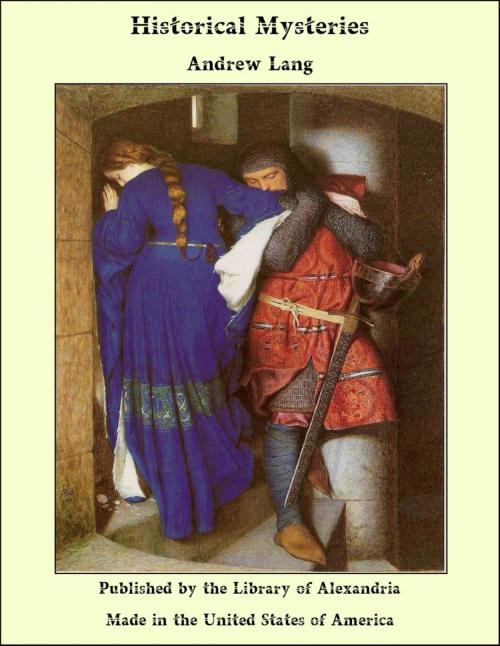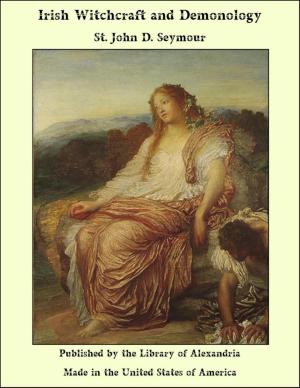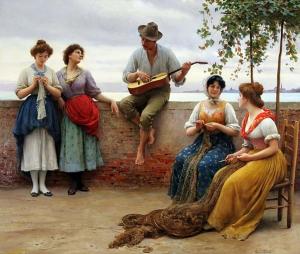| Author: | Andrew Lang | ISBN: | 9781465600875 |
| Publisher: | Library of Alexandria | Publication: | March 8, 2015 |
| Imprint: | Language: | English |
| Author: | Andrew Lang |
| ISBN: | 9781465600875 |
| Publisher: | Library of Alexandria |
| Publication: | March 8, 2015 |
| Imprint: | |
| Language: | English |
Many a man,' says De Quincey, 'can trace his ruin to a murder, of which, perhaps, he thought little enough at the time.' This remark applies with peculiar force to Philip II. of Spain, to his secretary, Antonio Perez, to the steward of Perez, to his page, and to a number of professional ruffians. All of these, from the King to his own scullion, were concerned in the slaying of Juan de Escovedo, secretary of Philip's famous natural brother, Don John of Austria. All of them, in different degrees, had bitter reason to regret a deed which, at the moment, seemed a commonplace political incident. The puzzle in the case of Escovedo does not concern the manner of his taking off, or the identity of his murderers. These things are perfectly well known; the names of the guilty, from the King to the bravo, are ascertained. The mystery clouds the motives for the deed. Why was Escovedo done to death? Did the King have him assassinated for purely political reasons, really inadequate, but magnified by the suspicious royal fancy? Or were the secretary of Philip II. and the monarch of Spain rivals in the affections of a one-eyed widow of rank? and did the secretary, Perez, induce Philip to give orders for Escovedo's death, because Escovedo threatened to reveal to the King their guilty intrigue? Sir William Stirling-Maxwell and Monsieur Mignet accepted, with shades of difference, this explanation. Mr. Froude, on the other hand, held that Philip acted for political reasons, and with the full approval of his very ill-informed conscience. There was no lady as a motive in the case, in Mr. Froude's opinion. A third solution is possible: Philip, perhaps, wished to murder Escovedo for political reasons, and without reference to the tender passion; but Philip was slow and irresolute, while Perez, who dreaded Escovedo's interference with his love affair, urged his royal master on to the crime which he was shirking. We may never know the exact truth, but at least we can study a state of morals and manners at Madrid, compared with which the blundering tragedies of Holyrood, in Queen Mary's time, seem mere child's play. The 'lambs' of Bothwell are lambs playful and gentle when set beside the instruments of Philip II.
Many a man,' says De Quincey, 'can trace his ruin to a murder, of which, perhaps, he thought little enough at the time.' This remark applies with peculiar force to Philip II. of Spain, to his secretary, Antonio Perez, to the steward of Perez, to his page, and to a number of professional ruffians. All of these, from the King to his own scullion, were concerned in the slaying of Juan de Escovedo, secretary of Philip's famous natural brother, Don John of Austria. All of them, in different degrees, had bitter reason to regret a deed which, at the moment, seemed a commonplace political incident. The puzzle in the case of Escovedo does not concern the manner of his taking off, or the identity of his murderers. These things are perfectly well known; the names of the guilty, from the King to the bravo, are ascertained. The mystery clouds the motives for the deed. Why was Escovedo done to death? Did the King have him assassinated for purely political reasons, really inadequate, but magnified by the suspicious royal fancy? Or were the secretary of Philip II. and the monarch of Spain rivals in the affections of a one-eyed widow of rank? and did the secretary, Perez, induce Philip to give orders for Escovedo's death, because Escovedo threatened to reveal to the King their guilty intrigue? Sir William Stirling-Maxwell and Monsieur Mignet accepted, with shades of difference, this explanation. Mr. Froude, on the other hand, held that Philip acted for political reasons, and with the full approval of his very ill-informed conscience. There was no lady as a motive in the case, in Mr. Froude's opinion. A third solution is possible: Philip, perhaps, wished to murder Escovedo for political reasons, and without reference to the tender passion; but Philip was slow and irresolute, while Perez, who dreaded Escovedo's interference with his love affair, urged his royal master on to the crime which he was shirking. We may never know the exact truth, but at least we can study a state of morals and manners at Madrid, compared with which the blundering tragedies of Holyrood, in Queen Mary's time, seem mere child's play. The 'lambs' of Bothwell are lambs playful and gentle when set beside the instruments of Philip II.















